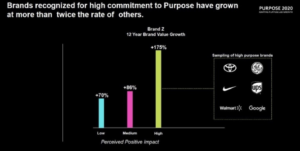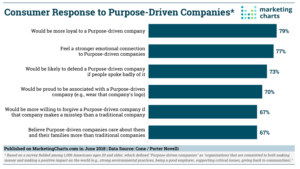By Sarah Colamarino
Brand Strategy – Healthcare
For health care companies, innovative technologies drive growth. Traditionally, they are taken to market through individual product brands. But is there an opportunity to build an additional source of growth from brand? Can a strong company brand with a purpose add value?
The data overwhelmingly confirms that purpose is valuable. Companies with a compelling brand purpose gain market share and grow three times faster than competitors, while achieving higher workforce and customer satisfaction. They show higher productivity, reduced employee turnover and 30% higher levels of innovation. Over the next 10 years, organizations using more purposeful language are forecast to earn total shareholder return that is 9% higher than today, versus less than 7% market average. Companies with a brand purpose are better able to future proof—they are six times more resilient in the face of negative publicity.
When this data is coupled with health care trends, opportunities are amplified particularly in the pandemic environment. As businesses from other sectors enter healthcare, bringing new technology with them, it is the purpose-driven companies that gain the highest operational efficiencies and innovate the most. As M&A continues to accelerate, companies with a clear purpose can bring their organizations together faster, focused on a common ambition. As health becomes more relevant and personal, purpose driven companies can more easily put the individual at the center and provide the holistic solutions that are the future of healthcare. The need to understand and engage in patients’ journeys opens new opportunities to create closer relationships and advocacy through the company brand. And as we all know, COVID-19 vaccines have made health care company brands like Pfizer and Moderna very relevant and broadly recognized.
So, what do we mean by company brand purpose? Think about a unifying and motivating ambition. Distinction and relevancy are critical. Today most health care company brands are pretty much the same. They talk about better health for more people. Or, they address their medical advances in a specific disease category. Do either of those clearly distinguish what the company stands for and its impact in society? Do they put the patient at the core? Are they relevant to stakeholders?
Think about the power of a clearly stated brand purpose that simplifies business strategies and motivates stakeholders. Pfizer is a great example. The Pfizer brand purpose is simple … “Breakthroughs that Change Patients’ Lives”. In his new book “Moonshot”, CEO Albert Bourla relates how this simple, actionable purpose drove the company to fast-track vaccine development, quickly upscale manufacturing capabilities, rapidly build clinical evidence and even make pricing decisions. This is brand purpose in action … simple, motivating and with a profound impact on society.
Health care is at a unique moment of relevancy in people’s lives with the pandemic. In addition to vaccine makers Pfizer and Moderna, companies with diagnostic tests and treatments, such as Abbott and Eli Lilly, achieved higher recognition than ever before. They contributed to a broader benefit for society. There is now the opportunity for even more health care companies to align their brand purpose with making an impact, increase awareness and relevancy, and build deeper connections with stakeholders.
How can company brand purpose become a source of growth?
- By helping to attract and retain talent, more critical than ever in today’s “war for talent”. Younger generations want to work for a company with a clear sense of purpose, with more than 70% of millennials expecting their employers to focus on societal or mission-driven problems.
- By creating collective impact. When company resources focus against a common, distinctive brand purpose, impact is multiplied. Meaningful impact cannot occur at individual brand levels.
- By rallying around common goals in areas such as ESG, DE&I and transparency. When what you do aligns with what you say, all parts of the company grow brand and reputation. And data shows that a good company reputation can accelerate business growth and lift market cap by 20 – 25%.
- By establishing resiliency. In today’s environment, health care products companies most likely will face negative publicity from product issues. Consistently building the company brand through distinctive stakeholder interactions grows trust and loyalty, mitigating the impact of negative press.
Building and executing a distinctive and relevant company brand purpose requires a deliberate approach. Leadership, business strategies, Human Resource policies, ESG, DE&I, Marketing, Communications and many other divisions must come together in a cohesive effort to build what the company stands for. It is a unique opportunity to create another source of growth for today and tomorrow.
Interested in learning more? Reach out and we can take you through our experience and best practices for building company brand purpose.
Sources:
- Purpose is Everything, Deloitte Insights, October 2019
- BCG Brighthouse, 2022
- Zeno Strength of Purpose Survey, 2020
- Deloitte, Success Personified in the 4th Industrial Revolution
- Healthcare Industry Trends 2022, Google
- Deloitte Insights, The Future of Health, 2022
- World Economic Forum

